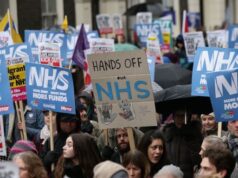Issue: 21
January 2015
This occasional newsletter is researched, written and edited by a group of concerned residents in Ealing, West London who want to preserve our NHS. We view the wholesale engagement of private, for-profit healthcare service suppliers as unnecessary, profligate and dangerous. Process improvement is what is needed in our NHS – not revolution.
Ealing Hospital A&E Performance – Now a National Scandal
Only 62.6% of patients attending Ealing Hospital A&E were seen within 4 hours during the week of 15 December 2014. This figure is worse than 139 other NHS hospital A&Es in England. In fact it’s the poorest performance of any NHS hospital in England. 951 people waited over 4 hours to be admitted. The national average was 315 people. As for ambulances queuing outside the hospital there were 227. The average across England was 60.5.
Just what is being done to improve this terrible performance? Who is to blame for this awful service?
According to Lewisham GP Dr Louise Irvine the real problem is the reduction in the number of acute beds. This leads to many more patients queuing on trolleys in hospital – for up to 12 hours in some cases. Delayed discharge of patients also adds to the problem. Social service cuts largely explain the delay in discharges.
We all know that the plan is to demolish Ealing Hospital including its A&E unit. How will this improve performance? This will leave the 338,000 Ealing residents with no major hospital and no A&E unit within the borough’s 21 square miles. This seems like criminal negligence to me.
New Northwick Park Hospital A&E Finally Opens on 10 December 2014
At a cost of £21million this new facility offers 40 individual treatment bays. The number of qualified nurses on each shift has been increased from 24 to 27. No numbers are provided by the NHS on the number of consultants on each shift – which is a concern. No information is provided as to whether additional Intensive Care/Acute beds have been created.
At 40 beds this new facility offers the same capacity as the one it is replacing. Why spent £21 million on a new facility which provides no extra capacity? Apparently a further 66 medical beds are promised for autumn 2015 – but in pre-fab modular units.
Senior staff at the Trust are quoted in the ‘London Evening Standard’ saying ‘…You don’t need a bigger A&E’ and ‘…the needs of the patients are not being met in the community’. Just what these statements mean is unclear to me. Are queues in ambulances, in A&E and on trolleys in hospital going to be reduced by more treatment/care in the community? If so,where, how, when and on whose budget?
Is the NHS Deliberately Confusing Us by Mixing Up Data on A&E Admissions and A&E attendances?
Excellent research by Colin Standfield of Save Our Hospitals has confirmed that there is no increase in patients visiting our local hospital A&Es. However, there is a painful increase in the number of patients waiting more than four hours to be treated in the A&Es. NHS managers are claiming that both the number of A&E admissions and the number of A&E visitors have increased, when it’s only the admissions numbers which have increased. The NHS target of treating 95% of visitors to A&E within four hours is being consistently breached. For the week ending 30 November 2014 NHS North West London Healthcare was the worst performing Trust in the country for Type-1 (most sick) patients at 65.7% waiting over 4 hours.
‘Arrest Drunks Clogging up A&E’ Trumpets National A&E Leader in ‘The Observer’
Dr Cliff Mann, President of the College of Emergency Medicine wants fewer drunks clogging up hospital A&E units. He says threatening drunks with arrest will stop them drinking alcohol.
What a load of nonsense.
For starters not everyone who presents at A&E as being drunk is actually just drunk. They may have other physical illnesses or injuries which require treatment and which may require admission to hospital.
The Police Federation sees little merit in arresting drunks. The charity Alcohol Concern thinks we are not getting ‘to the heart of the problem’.
The heart of the problem, and what is missing in the article, is the direct connection between mental illness and alcohol abuse. For Dr Mann and ‘The Observer’ not to refer to this in the article is gross negligence. The National Bureau of Economic Research (NBER) reports that there is a ’definite connection between mental illness and the use of addictive substances’. NBER research reveals that people who have been diagnosed with a mental health condition at some time in their lives consume 69% of all alcohol consumed.
So what is clearly needed is more money and resource invested in training and employing more therapists in the treatment of those patients whose mental illness symptoms include substance abuse.
More on the links between mental illness and substance abuse at www.dualdiagnosis.org
Some Young Adults Preferring A&E Walk-In Attendance Rather Than GP Appointments System
Citizens Advice researched 900,000 people across England and found that 18 – 34 year olds are more than twice as unlikely to be able to secure a suitable appointment with their GP as those 55 years old and over. Similarly these young people were twice as likely as 55+ olds to use their local hospital A&E walk-in service rather than their GP. So…even more pressure on A&E units.
‘Sell Off’- A 60 Minute Film Featuring Doctors and Healthcare Researchers Describing the Destruction of Our NHS
This excellent film covers a wide range of NHS issue including:
+ inappropriate and expensive internal market
+ PFI hospitals creating huge public debts and huge private profits
+ Government lies
+ Health and Social Care Act 2012 – fatally flawed
+ Foundation Trusts/mergers – about profits, not patients
+ planned NHS service downgrading as a trigger to introducing private service suppliers
+ politicians joining the boards of private healthcare providers and consultancies
+ CCGs as instruments to bring in privatised insurance based healthcare
+ massive fees paid to management consultancies, especially to McKinsey & Co
+ TTIP – granting power to US corporates on a par with nation states
+ intimidation of whistle-blowing NHS staff
One of the key narrators in the film is the famous healthcare researcher Professor Allyson Pollock. The film is produced by Peter Bach.
A must watch.
A GP Surgery Attempts to Refuse to Treat Mental Health Patients and NHS England Puts a Stop to It
A GP surgery in Newton Abbot in Devon emailed its 10,000 patients recommending they should not seek help from the surgery for a range of conditions, which included ‘mental wellbeing concerns’. Instead these troubled people should contact local NHS mental health services. On 2 December 2014 NHS England intervened to say that the surgery’s recommendations were unacceptable. The Department of Health stated that the surgery’s approach flouted the GP contract and that it is unacceptable for surgeries to turn away patients in need.
Four West London Councils Collaborate and Set Up an Independent Commission to Investigate Deteriorating Local Hospital Services
Brent, Ealing, Hammersmith & Fulham and Hounslow Councils are to work together and impartially study the impact on patient services caused by local hospital closures. The commission will take evidence from the NHS and from other organisations and individuals. Chairing the commission is the human rights specialist Michael Mansfield QC. Other members of the commission include renowned NHS researcher Dr John Lister and retired Chiswick GP Dr Stephen Hirst.
London Mental Health Strategic Network
This new London initiative involving 22 organisations is working on a set of recommendations for commissioning mental health crisis services across London. Recommendations include a round-the-clock telephone help line, 24-hour psychiatric services in accident & emergency departments across London and mental health crisis training for GPs, practice nurses and community staff. The organisations involved include Mind, the Metropolitan Police, NHS, social care, housing and local Councillors.
This initiative is attempting to meet the needs of the Crisis Care Concordat launched in February 2014. The concordat is a national agreement between services and agencies involved in the care and support of people in crisis. It is supported by 22 national organisations.
More on the network and the concordat at www.crisiscareconcordat.org.uk
NHS Spent £640 Million on Management Consultants in 2014
Professor David Oliver writing in the British Medical Journal has slated the NHS for spending so much on management consultants. He quotes day rates of between £3,000 and £4,000. Professor Oliver, a prominent advisor to the Department of Health, believes adequate management skills exist in the NHS which could be used instead of consultants.. He regards money spent on consultants as wasteful and unnecessary.
Project to Share Patient Data Held by GPs Delayed Yet Again
The Government’s care.data project, which aims to extract and use patient data held in GP records, has suffered yet another set back. This time a report by National Data Guardian Dame Fiona Caldicot and the independent Information Governance Oversight Panel has reported significant questions, concerns and recommendations for the project. Jeremy Hunt wants these issues to be resolved by NHS England before care.data can go ahead.
care.data was initially put on hold in February 2014 after widespread concerns were expressed. Many GPs expressed the wish in May 2014 that the scheme should only go ahead with patients explicitly consenting by opting in.




